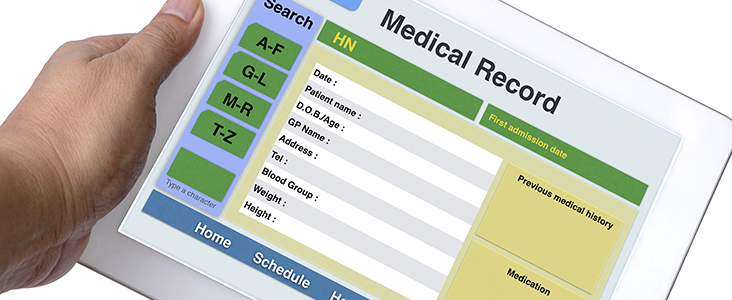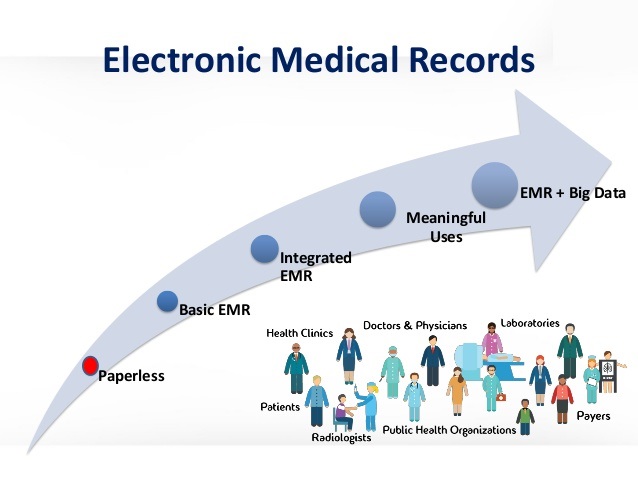The discovery of medicines and medical science is the biggest event in the history of mankind. From ancient times till a few centuries back the patients were treated successfully by the physicians, but there were hardly any records available for every case they handled and every aspect of that case. We have lost that data, which could have been helpful in the modern medical world. Many special treatments were given for particular symptoms, and any different kinds of techniques used while treating the patients or any new type of medicinal formulas have gone under the cover of undocumented history. When we understood the need for recording data in the healthcare sector, it gave rise to different types of medical records.

Earlier these records were mostly handwritten. Slowly the report typing system was introduced. We faced multiple disadvantages with this type of medical record.
- There was no copy of the records, so if the record gets misplaced/damaged there is no backup for the data.
- Handwritten documents were many times illegible, so the data extracted from those documents was partial.
- Damaged handwritten documents used to get fade up, which was again a problem in the integrity of the data.
- Archival of those records was a big task.
- Handling those records was difficult.
- For any purpose, those documents needed to get reorganized manually.
- As it was based on manual activity, most of the time the data on the actual record was incomplete.
- There was a limitation for data capturing due to dependability on the type of data (graphical reports were difficult to capture as a medical record).
- The portability of the documents and transferring data to the other centre was a headache.
- Records were misplaced multiple times and no copies were available for the same.
- During that period the importance of medical data was not very well understood and therefore medical data privacy and ethical practices were not much implemented for any medical records.
- Data capturing on a timely basis was time-consuming and difficult for healthcare professionals.
Electronic Health Records
IT Field extended its tools to help the medical domain in solving these problems. This has given rise to the concept called Electronic Medical Record, widely accepted and practised these days and also known as EMR. This brought a revolution in the field of medical data handling.

Adding medical data for any patient on computers, storing it in a small hard drive, reviewing the same data again and again, and easily updating and editing the data are a few of the key benefits this system has provided to us.
Types of EMR
Medical health records start with entering the patient with his/her specific ID numbers into the computer. Adding the history of the patient including social, family, past medical, surgical history and medicinal history generates an initial intake report, which is used and updated every time the patient visits the centre.
- Various office notes, chart notes, and therapy notes generated date-wise provide detailed information about the treatment flow of that patient.
- Operative reports, nurse’s reports, assessment and flow sheets, and discharge summaries provide accurate data for every minute spent during hospital admissions. These also include various graphs, which add value to the data. They are also system generated and a part of the medical health record.
- Antepartum records, birth records, development records, death records and also postmortem reports have their own importance.
- Various MRIs, CT scans, laboratory studies, x-rays and other diagnostic studies are reported via electronic medical records only.
Advantages of EMR
- Data can be stored and can be reviewed multiple times, got rid of pills of files.
- Editing and updating the data is easy.
- Electronic capturing system forms make sure that the data is complete and with the latest technology, we can be sure about the integrity of the data.
- Medical data privacy and ethical practices can be very well implemented as part of the HIPAA privacy rule.
- Secured portability of the data is possible using this latest technology.
- Damage to the data is very rare and can be corrected easily.
- Illegible data is no longer a problem.
- Archiving a large amount of data is cost-effective, safe and easy.
- Reduced data capturing time.
- Very easy to handle and generate.
- Require less space.
- Reorganization of the medical records is very easy.
The scope of EMR
All the leading countries and developing countries are using EMR in their day-to-day medical data capturing.
- Past records are required in deciding the current treatment.
- Analyzing the effectiveness of drugs in drug development.
- In insurance/claim processing.
- In deciding disability status.
- For any medico-legal actions.
- As a part of the police investigation.
- Employment scanning.
- Drug dispensing and monitoring systems.
- Auditing research and evaluations.
Laws for EMR
The laws, rules, and regulations change in every country for
- Accessibility
- Privacy
- Ownership
- Archival period.
- Destruction of EMR
EMR indeed is a bestowal as it has improved the quality of healthcare services and healthcare professionals can now focus more on the core work by spending very minimal time and energy on EMR.
Author Bio
ITCube Solutions is a Business Process Outsourcing Service provider since 2003. ITCube focuses on working closely with clients to document various operating processes and to determine the key performance parameters (KPIs) that can be used for evaluation. As an outsourcing organization, ITCube can also help growing companies identify parts of the business development management process that should be moved to a team that can quickly become an extension of the client’s organization.










